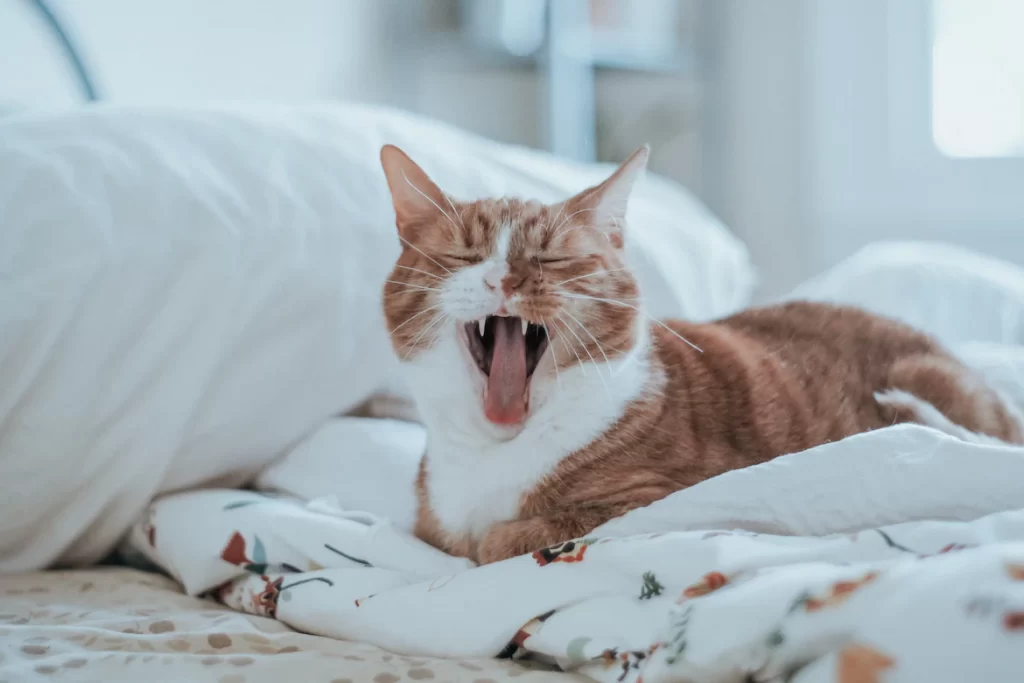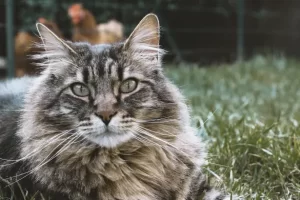Last updated on March 11th, 2023 at 11:12 pm

Cats may not appear to be the most fragile creatures in the world, but could they be more delicate than expected? Are cats’ teeth so weak that they eventually just fall out on their own? As any cat owner knows, it can often times seem like your feline family member is in perfect health one day and then suddenly has missing teeth or broken incisors. To unravel this mystery, we must dig into a few things about cats, including what causes them to lose their baby teeth and if there are habits which can increase the likelihood of eventual dental problems. Take a look at these common questions surrounding cats’ care and oral hygiene to get a better understanding of how cats’ teeth work – whether or not that includes falling out.
Why do cats’ teeth fall out?
Teeth can fall out in cats for a multitude of reasons, both healthy and unhealthy. Baby teeth will inevitably fall out for space for adult teeth in kittens. By the time a baby is 6-7 months old, this process should have started about 3-4 months. Having your kitten’s vet check them out to check out whatever underlying dental disorders if they are more than 7 months old and still have a lot of baby teeth.
In adult cats, teeth may fall out due to some reasons. These are:
• Poor Dental Hygiene: Just like human teeth, cats’ teeth require daily care and regular brushing to remain healthy and strong. Without proper dental hygiene, plaque can build up on their teeth, leading to tooth decay and eventual tooth loss. Proper oral hygiene, regular dental exams and the use of dental diets can help to prevent dental problems and tooth loss in cats.
• Injury: The most frequent reasons for a cat to lose its teeth is injury to the mouth. A veterinarian should be consulted to ascertain the reason for a cat’s periodontal diseases and to administer the proper care to preserve the condition of the cat’s remaining teeth.
• Disease: Certain diseases, such as feline odontoclastic resorptive lesions (FORLs), can cause cats’ teeth to become brittle and susceptible to breakage. Additionally, oral tumors may crowd out and push healthy teeth out of position, resulting in the loss of those teeth.
• Genetics: Certain genetic illnesses in cats, like feline leukemia as well as feline immunodeficiency viruses, may make them more prone to dental issues, like tooth loss. Hence, heredity may contribute to cats losing their teeth.
• Age: As cats age, their teeth naturally become weaker and more susceptible to breakage or decay. Regular dental care can help reduce the chances of tooth loss in older cats.
When do cats’ teeth fall out?
Cats have grown accustomed to humans, but it’s important to remember that they still retain some of their wild habits. One such habit is the loss of teeth: cats sharply contrast with humans in this aspect because unlike human children, cats lose all of their teeth at a predictable age. Kitten’s baby teeth will begin to fall out as soon as they reach two months old, and these primary teeth will be replaced by adult ones by the time they’re six months old. Afterwards, an adult cat’s incisor and canine teeth should remain firmly rooted until their senior years. For elderly cats, tooth loss can become a common side effect due to gum disease or mouth injury caused by accidents. Fortunately, both issues can be prevented with the help of routine check-ups at the vet and appropriate dental hygiene for your feline friend.
Signs Your Cat Is Teething
Kittens begin teething at around three to four weeks of age, and this process can last up to six months. During this time, you may notice certain signs that your kitten is teething. These include:
• Excessive Drooling: Kittens tend to drool more than usual when their teeth are coming in. This is because the gums are tender and sensitive when the teeth start to push through. Your cat also might become more hyperactive and have a bigger appetite throughout that period. The soreness may also result in more drooling, that you might notice.
• Chewing: Kittens may chew on objects as a way to soothe their sore gums. Crinkly paper or cardboard can be particularly interesting for kittens in this stage, and they may even resort to chewing on inappropriate items around the house like furniture, wires, or clothing.
• Lack of Appetite: Your kitten may not be as interested in eating her regular food when she is teething. This can be due to tender gums and a general lack of appetite during this time.
• Fussiness: Teething kittens may appear to be unusually fussy or cranky. This is usually due to the discomfort they are experiencing in their gums as new teeth come in.
• Increased Salivation: As kittens start to chew on items, this can result in increased salivation. You may also notice that your kitten drools more than usual during this time.
• Bleeding Gums: The emergence of your kitten’s new teeth can sometimes cause bleeding gums and this is perfectly normal. However, if you notice excessive blood or signs of infection, contact your veterinarian right away.
Cats’ Teeth Care
When cats teeth become worn or damaged due to age, naturally occurring bacteria produces an acidic environment in the mouth causing further decay. Fortunately, there are several ways that cat owners can mitigate this damage through proper oral care and regular veterinary visits. According to Dr. Richardson (https://www.goodrx.com/pet-health/cat/cat-teeth-cleaning) through the use of dental chews, brushing, and professional cleanings, cats can enjoy a lifelong healthy set of sparkling pearly whites – never having to worry about outgrowing their choppers.
Teething cats go through a period of discomfort when their adult teeth come in. This process can take anywhere from three to ten months and can cause your kitty some discomfort. To help your cat get through teething, there are several things you can do:
• Provide plenty of chew toys: Give your cat plenty of safe chew toys to help keep their gums and teeth healthy. Look for cat toys made specifically for teething cats, as they are designed to be safe and comfortable for your kitty’s delicate mouth.
• Schedule regular dental check-ups: Regular dental exams by a veterinarian can help diagnose any issues that could be causing your cat discomfort during teething.
• Brush your cat’s teeth: Regular tooth brushing can assist maintain good oral health, prevent plaque and tartar development, and enhance general wellbeing in cats. It also lessens the discomfort and suffering associated with teething. Make an effort to brush your cat’s teeth on a weekly basis, or at the very least using a cat-specific toothbrush as well as toothpaste. Start out slowly and give your cat gratitude for being well-behaved while being brushed.
• Offer healthy dental treats: There are many dental-specific treats on the market that can help to keep your cat’s teeth and gums healthy. Look for treats that are designed to help reduce plaque and tartar buildup, as well as products that contain natural ingredients known to promote oral health.
• Use a dental spray or gel: Products such as dental sprays or gels can be used to help freshen your cat’s breath and keep their teeth and gums healthy. Look for products that contain natural ingredients known to help reduce plaque and tartar buildup.
Why Cat Dental Care Is Important
Cats make wonderful and affectionate pets, and just like people, they need routine dental treatment to remain strong and content. The maintenance of your cat’s dental health and the prevention of any possible illnesses depend on proper cat dental care. Cats with dental disease may be in pain and suffering from infections that can spread to other parts of the body. Bacteria in the cats’ mouth, if left untreated, can cause serious health problems such as periodontal disease and even heart, liver, and kidney damage. To keep your cat healthy and prevent these diseases, it’s important to provide them with regular dental care.
Regular home dental care includes brushing your cat’s teeth, which helps remove plaque and bacteria. It is important to use a toothbrush and toothpaste specifically made for cats as human toothpaste can be harmful. If your cat objects to having their teeth brushed, try using a finger brush or wipes instead. Additionally, dental treats and food can help keep teeth clean by helping to scrub away plaque and bacteria. You should also take your cat for regular veterinary checkups and professional teeth cleaning as needed.
By following a good dental care routine, you can help ensure that your cat’s mouth stays healthy and free of harmful bacteria. With the right preventive measures in place, you can keep your cat’s teeth and gums free of plaque and tartar buildup. This will ensure that your cat has healthy teeth for years to come. Additionally, regular checkups with the vet can help detect any issues early on so they can be treated quickly and effectively. A healthy mouth is an important part of overall pet health, so make sure to keep up with regular dental care for your cat.
With good homecare and regular vet checkups, you can ensure that your cat has a healthy mouth, clean teeth, and good overall oral health. Good dental hygiene will help keep your cat’s mouth healthy and happy for years to come. Take the time to brush your cat’s teeth regularly and have checkups with the vet to make sure their oral health is in tip-top shape.
How To Brush Your Cat’s Teeth
Brushing your cat’s teeth is an important part of their oral health. It helps protect them from periodontal disease and other dental problems, which can be very painful and expensive to treat. Fortunately, brushing a cat’s teeth isn’t as difficult as it might seem! Here are some steps to help you get started:
1. Get the right supplies. Most pet stores carry special cat toothbrushes and toothpaste. You can choose from soft-bristled or finger brushes, depending on what your cat is more comfortable with. Make sure to get a toothpaste specifically made for cats – never use human toothpaste!
2. Make it a positive experience. Before you start brushing your cat’s teeth, make sure they are relaxed and comfortable. You can try giving them treats to get them used to the idea of having their mouth touched.
3. Begin slowly and gently. Start by just rubbing the toothbrush around your cat’s lips, then progress to gently brushing their teeth. Try to pay special attention to the back molars, where plaque tends to build up.
4. Be persistent. Brushing your cat’s teeth is a habit that needs to be done regularly for it to be effective. Make sure you brush at least twice a week or more, depending on how much plaque is present.
5. According to Dr. Richardson, you should only use cat-specific toothpaste to clean the teeth. Human toothpaste can be toxic to cats so it’s important that you use one that is made specifically for felines. Most pet stores will carry toothpastes and brushes designed for cats, but if not you can find them online or ask your veterinarian.
Conclusion
It’s a common misconception that cats’ teeth fall out when they reach adulthood. In fact, cats have thirty two permanent teeth. Cats start losing their teeth due to injury or poor dental health when they are older. Tooth loss is caused by bacteria that line up along the gum and lead to inflammation and eventual tooth corrosion, not age or genetics. To keep your cat’s teeth healthy as he ages, it’s best to brush them regularly or use an oral care gel every few days to prevent bacterial accumulation from food and saliva residue. Give your furry friend the long-lasting gift of a healthy mouth by taking extra time each week for thorough tooth cleaning.


